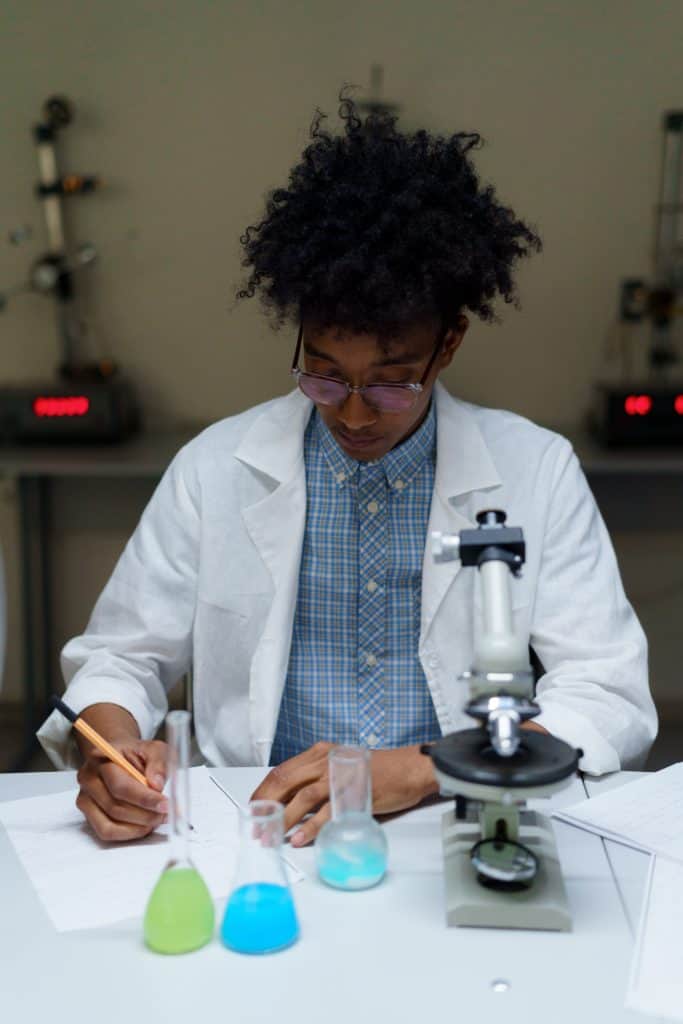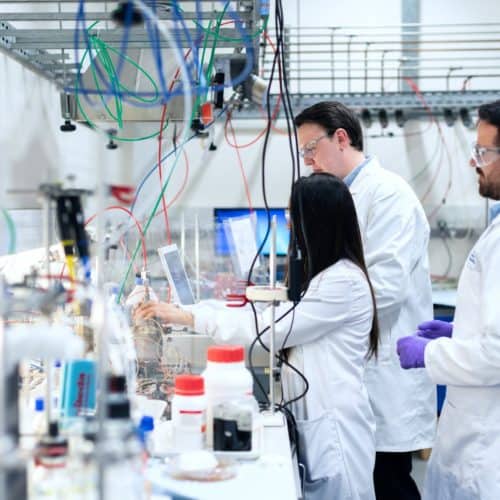
Gap years allow you to improve your medical school application. Moreover, you can further explore if medical school is right for you. In this article, I use my coaching experience working with pre-med students to cover a number of ways to effectively spend a gap year before medical school in order to strengthen your application and competitiveness.
We will discuss what a gap year is, its pros and cons, as well as cover the following fantastic gap year options that you can do before medical school:
- Master’s Program
- Post-Bacc Program
- Medical Scribe
- EMT
- Medical Assistant
- Teaching
- MCAT studying
- Research Assistant
What is a Gap Year?
A “gap year” is a length of time (semester or year) between the end of your undergraduate education and the beginning of your post-secondary education. Importantly, gap years give you the opportunity to do a number of things including self-discovery, exploration of educational and professionals interests, and a break from academics.
What are advantages of a gap year?
Gap years have the potential to significantly impact your personal growth, as well as your professional and educational trajectory. Here are some pros of taking a gap year:
- Explore what you are passionate about
- Experiential learning
- Potentially earn money
- Strengthen your application or CV
- Gain maturity and personal growth
- Expand your network
- Avoid burnout from academics
Benefit with a break from school while enjoying experiential learning
Having a dedicated period of time away from traditional education offers lots of perks. Depending on what you elect to do for a gap year, you may enjoy taking a break from traditional schooling and avoid burnout. For example, if you decided to do medical scribing or EMT, you can enjoy experiential learning without having to take classes and tests. These opportunities also bolster your medical school application while earning money.
Gain clinical exposure and personal growth while making money
I’ve worked with students who have worked as medical scribes and assistants during their gap years and witnessed how it developed their maturity, personal growth, and professional skills. They have also enjoyed saving up money to pay for medical school application costs, repay debts, or save up for tuition.
Expand your network
Additionally, my students that have done gap years at medical institutions or pharmaceutical/biotech companies often have access to great physician mentors. Thus, expanding your network is also a great benefit of gap years.
What are cons of a gap year?
It’s important to weigh in the cons of a gap year when making a decision. Some cons of taking a gap year:
- Lose one academic year
- It can be expensive
- You may lose academic momentum
- Feeling the age gap
High tuition costs
If you are doing a post-bacc or master’s program, you may be faced with high costs. For example, Tuft’s Master’s in Biomedical Science Program comes with a $54,554 annual tuition. Additionally, Colombia’s Pre-Med Postbacc Program in 2021-2022 cost $42,856 for a 22-point program. Additional room/board fees, personal expenses, and miscellaneous expenses, can result in over program costs of over $60,000 a year.
No longer using study or test-taking skills
On the other hand, working a job or volunteering may slow down the momentum and erode the skills you built up for studying and test-taking.
Feeling the age gap
When I talk to students who take multiple gap years, they often share that their other med school classmates feel very “young” – particularly the ones that are straight out of college. Because of the age gap between other students, it may feel harder to fit in and relate to peers when you finally start medical school.
In summary, it’s important to weigh the pro and cons of a gap year to determine if it is a good decision for you.
Is it bad to take gap years?
Under most circumstances, taking a gap year is actually viewed positively. After all, you have accumulated more life and professional experiences and skills. On the other hand, if you spent your gap years only doing soul-searching, then it would not be viewed positively.

How medical school matriculants spent their gap years?
The majority of medical school matriculants take a gap year before applying. According to the AAMC 2019 survey of incoming medical students, 43.9% of students who enrolled in medical school took one to two gap years. Of the students surveyed, 13.4% also took three to four gap years and 7.9% took five or more gap years. Moreover,
With a large subset of students taking gap years, the average age of students entering medical school is 24 according to the AAMC.
When incoming medical school students were asked how they spent time off between undergrad and medical school on the AAMC survey, the most popular ones—with respondents allowed multiple answers—were:
| Gap Year Activity | Percentage |
|---|---|
| Was in another career | 53% |
| Improved finances | 38% |
| Volunteered/worked in research | 23% |
| Pursued graduate studies | 22% |
| Helped fulfill family obligations | 22% |
Areas of your med school application to target during a gap year
It’s important to thoughtfully reflect on what are the strengths and weaknesses of your medical school application and how you can leverage a gap year to address any weaknesses. For example, here are the important factors that medical school committees look at:
- Undergraduate prerequisites and GPA
- Clinical and social service work
- Strong narrative for why medicine
- Personal background
- MCAT
Given these factors that are considered for admission, it may warrant taking a gap year if there are gaps in any of these. For example, if you are missing any undergraduate requirements or your GPA is lower than medical school averages, then it may be worth taking the time to address these.

If you do not have enough clinical or social service work, then consider a gap year to gain shadowing and clinical volunteering experiences.
Lastly, MCAT is also an important factor. If your MCAT does not meet what is accepted for medical schools, you can take advantage of a gap year to improve your MCAT score.
Options to maximize your gap year time
1. Post-Bacc Program
What is a post-bacc program?
A post-baccalaureate program—or post-bacc—is a one or two-year program you enroll in after college. The intent is to attain a second BA/BS degree and complete required medical school courses.
I’ve known quite a few medical school classmates who had completed post-bacc program after doing a career change. Some have also done it straight out of college in order to increase their competitiveness.
Post-bacc programs offer academic structure and med school support
Some post-bacc programs have academic, MCAT, and medical school application support. For example, I am a teaching assistant for a medical school preparation course for my institution’s master’s students. We help with everything – from advising, personal statements, application, and interview preparation!
Additionally, many post-bacc programs are affiliated with medical schools, which will boost chances of being admitted into the medical school class afterward compared to traditional applicants. Of course, there is no guarantee but it improves your odds.
Who should consider a post-bacc program?
It’s worth considering a post-bacc program if your GPA is lower than what is normally accepted at medical schools. Also, if you did not complete pre-med courses during college. Or perhaps, you made a career change and now want to pursue medicine.
Post-bacc programs may differ in their focus
Some programs also grant degrees and others grant certificates. Post-bacc programs can have special focuses, such as underrepresented in medicine individuals. To illustrate these differences we will go through each general type of programs with specific examples:
- Non-degree granting post-bacc programs
- Special Masters Program
- Post-bacc with specific focused demographics
Non-degree granting post-bacc programs
Students will benefit from a structured environment that may have pre-med advising, application preparation, and MCAT review. Additionally, some programs may have linkage agreements with medical schools that may give affiliated post-bacc students higher consideration for interviews.
Who should consider it?
If you want to increase your GPA. The curriculum at the post-bacc program will contribute to your cumulative undergraduate GPA. Therefore, if you do well in these post-bacc classes, you can increase your GPA and make it more competitive.
Consider this program if your GPA is lower than 3, as their admission requirements are less rigorous.
Some post-bacc programs require that you’ve completed all of your medical school requirements. Be sure to look at the eligibility requirements for each program, carefully.
Here are a fewpost-bacc programs and the resources they offer students:
| Post-Bacc Programs | Resources | Eligibility Requirements |
|---|---|---|
| Tufts Postbac Premed Program | Linkage program Help with applying and interviewing for programs, mock interviews, and study strategies | It is for those who have not yet taken most of the prerequisite science courses for their intended health career |
| Lewis Katz School of Medicine Postbaccalaureate Program | 10-months long Receive conditional acceptance to this medical school for the following fall without a gap year. | Designed for those who have completed the foundational science coursework. |
| University of Pennsylvania Prehealth Program | Linkage agreement Advising Application preparation and interviewing | Examines all aspects of each candidate’s academic background and health-related experiences |
Special Master’s Program
A Special Masters Program (SMP) is a master’s degree program that aims to prepare students for medical school and improve a medical school applicant’s academic credentials.
Grades from this program will be reported as a separate GPA from undergraduate.
Who should consider it?
Consider this if you want to increase your GPA but your GPA is already 3 or above. Generally, these programs require GPA above 3.0 and have more rigorous admission requirements than non-degree granting post-bacc programs. You can determine the individual requirements by each school on their website. Let’s talk a look at a few:
| MS Program | Description | Eligibility |
|---|---|---|
| Tufts University School of Medicine Master of Science in Biomedical Sciences | Designed to prepare for the rigors of professional schools. Volunteer opportunities within the TuftsCARES Initiative combine your classroom learning with clinical experiences. | Must have all pre-medical requirements completed with a C- or better |
| Robert Wood Johnson Medical School Masters of Biomedical Sciences | Take courses such as Anatomy with cadaver dissection and Physiology, Pharmacology, Microbiology and Immunology Students are paired with faculty mentors to conduct their individual research projects | |
| University of Cincinnati Master’s program in Physiology | A one-year program Helps graduates strengthen their academic credentials in preparation for application to U.S. medical schools A significant integrated experience with first-year medical students | |
| Colombia’s Postbac Premed Program | Postbac 101: weekly workshops to present themselves as competitive applicants to medical school and pitfalls to avoid Advising appointments Clinical or research opportunities: Linkage agreement: enables highly-qualified Postbac Premed students with a strong interest in the school to accelerate the application process | Students who have completed all of the requirements for medical school are not eligible to apply to the Program Read more here. |
| Boston University Master of Medical Sciences program | A 32 credit program that can be completed in 1 or 2 years Coursework in the medical sciences Students may also opt to pursue interests in other areas such as Public Health, Mental Health Counseling and Behavioral Medicine, or Clinical Research by entering a dual degree or concentration program. | Minimum cumulative undergraduate GPA of 3.0. |
Focused Post-Bacc Programs
Some post-baccs are only open to students from a particular background or demographic. For example, Wayne State University requires students to be a Michigan resident and a first-generation college graduate. PREP programs, which help students gain research experience and mentorship to pursue a PhD or MD/PhD, encourage applications from underrepresented groups or disadvantaged backgrounds.
| Program | Description | Eligibility |
|---|---|---|
| Wayne State University Post-Bacc | A non-degree-granting program For qualified, low-income students seeking admission to medical school | Be a first-generation college graduate Be a Michigan resident Have a minimum MCAT score of 491 Read more |
| PREP Programs | Hosted at a number of instititutions, PREP program encourages individuals from underrepresented groups or from disadvantaged backgrounds who hold a recent baccalaureate degree in a biomedically relevant area of study to pursue a PhD or MD/PhD | |
| John Hopkins Career Changer Post-Bacc | Exist for the sole purpose of providing the students who did not complete premedical requirements as undergraduates with the basic premedical sciences and complementary coursework and experiences—generally within the time frame of a year or 15 months. | The general rule is that if you have taken more than half of the science requirements for medical school, you are not eligible for the program. |
Questions to ask when narrowing down post-bacc programs
| Is there a linkage program? And how many students have entered med school through linkage programs? | |
| What’s the availability and supportiveness of the program staff? | |
| What academic support is available for classes and MCAT? | |
| What is the program’s cost and financing options? | |
| Timeline of the program – from start of program to start of medical school | |
| Where are program graduates at now? | |
| What is the program culture? | |
| What resources and support are available to help with the medical school application process and interviews? |
For a larger list of post-bacc programs, check out this list here and here
2. Working as a Medical Scribe, Medical Assistant, or Emergency Medical Technician
These experiences can double as earning money and gaining clinical experience. Accumulating clinical hours can help demonstrate your commitment to serving patients and interest in medicine. This is a good gap year option to consider for students with competitive MCAT and GPA but need more clinical exposure.
I’ve worked with numerous students who have spent their gap years in one of these roles. They often have a plethora of anecdotes that they can tie their passion for medicine back to and include in their personal statements.
Who should consider it?
If you want to increase your clinical exposure and hours while earning money. You are comfortable with your GPA and have taken the MCAT, or plan to take the MCAT during your clinical experience.

3. Clinical or Laboratory Science Assistant
According to the AAMC, the majority of medical students have some research experience prior to applying. A 2019 AAMC survey of incoming medical students showed that ~60% of respondents participated in a laboratory research experience during college. Among survey respondents who took gap years between college and medical school, 46% stated that a portion of their gap year was spent volunteering on some form of research.
While research is certainly not required for medical school, it can improve the competitiveness of your application. If you are applying for MD-PhD, it is critical to have significant research experience. Moreover, having papers published or poster presentations at a conference can further bolster your application.
Who should consider it?
This is a good opportunity for those who have a solid GPA but want to increase their research experience. There is also flexibility to take or retake the MCAT during research gap years. Additionally, attaining a paid research position can help financially.
4. Teaching
I’ve worked with a couple of students and known a few peers who were in teaching positions. Specifically, they taught disadvantaged communities through Teach for America. This demonstrates a desire to serve underserved communities, which is a mission for many medical schools. Additionally, teaching helps develop maturity, empathy, and professional skills. You can check out TFA alumni in the medical field here.

Who should consider it?
If you are comfortable with your GPA and want to do something non-medical while assisting underserved communities. You can also take the MCAT during your time teaching. However, be ready to justify the shift from teaching to a medical career in your personal statement and interviews.
Final Thoughts
There are lots of options when it comes to improving your competitiveness through post-bacc options – whether it’s more school or working as a medical scribe.
Consider the gaps in your application to guide you in your decision-making process.
For example, if you have mostly academic gaps, then consider a program that will elevate your undergraduate GPA or provide a master’s program GPA.
If you have gaps in clinical hours, then consider taking on the roles of a EMT, medical scribe, or research assistant.
If you want to do something non-medically related, then consider Teach for America.
Good luck!


